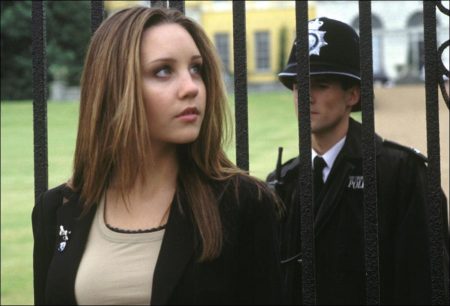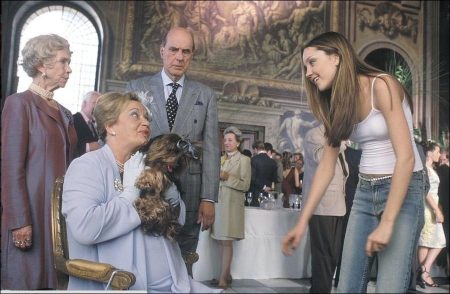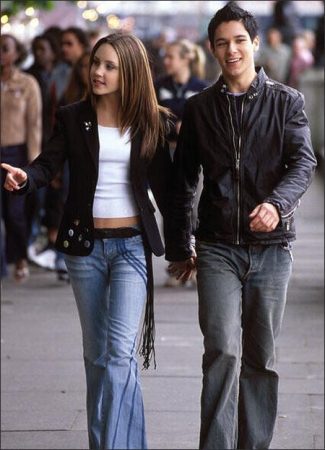What A Girl Wants Movie Trailer. Inspired by the fairy tale charm of the 1958 Sandra Dee–Rex Harrison romantic comedy The Reluctant Debutante, producer Denise Di Novi developed What A Girl Wants, the coming-of-age story of a spirited young woman who dreams of forging a relationship with the father she’s never known. “I think every young girl dreams of finding her prince,” says Di Novi, producer of the inspirational romances A Walk to Remember and Message in a Bottle. “In What A Girl Wants, we have a girl who longs to make her fairy tale fantasy come true, but the prince she’s searching for is her father.”
The girl is Daphne Reynolds, a vibrantly independent seventeen year-old played by Amanda Bynes, star of the new WB comedy What I Like About You and the popular host of Nickelodeon’s The Amanda Show. “Anyone who has kids is aware of Amanda Bynes,” says producer Bill Gerber, whose children watch The Amanda Show religiously. “She’s very bright and has incredible comedic timing. She was only fifteen when we first met with her about this project, and it’s rare to find someone of that age with such maturity and talent.”
“Amanda lights up any room she walks into,” adds producer Hunt Lowry, President and CEO of Gaylord Films/Pandora. “She’s a gifted physical comedienne who radiates the same irreverent charm that instantly endears Daphne to the audience.”
“Like Amanda, Daphne is a girl on the cusp of womanhood,” says director Dennie Gordon, who impressed the filmmakers with her skillful directorial work on the hit comedy TV series Ally McBeal. “She’s street smart without being the least bit jaded. She’s kept her innocence as a very real, accessible girl-next-door.”
Raised by her bohemian mother Libby in New York City, Daphne “fantasizes about what it would be like if her father was in her life,” Bynes explains. “She feels incomplete without knowing this important aspect of herself, especially at this crucial age, when she’s trying who she is and who she wants to be.”
Although Daphne knows the story of her mother’s soulful romance with Henry, the dashing Englishman who broke her heart, Libby made a conscious decision to raise her without his knowledge or support. “Libby chose to raise Daphne as a single parent out of love and protection,” says Kelly Preston, a mother of two who imbues the vivacious Libby with her own infectious joie de vivre. “She didn’t want to introduce Daphne’s father into their lives because she mistakenly believes he turned his back on her nearly 20 years ago, and she doesn’t want him to do the same thing to Daphne.”
The catalyst that sparks Daphne’s decision to find her father occurs at a wedding that she and Libby, a wedding singer, are working in New Jersey. “Daphne has waitressed at countless weddings, and once again, she finds herself watching the traditional father-daughter dance and longing to live out that fantasy herself,” Bynes describes. “All these feelings inside her suddenly crystallize and she makes the very grown-up decision to go find her dad.”
Armed only with a photograph of her father and his name, Henry Dashwood, Daphne hops a flight to London determined to make her fantasy a reality. “She’s spontaneous and she doesn’t think about the consequences,” says Bynes. “I think it’s a sign of Daphne’s self-confidence and bravery that she knows what she wants and she goes for it.”
“We don’t want every teenage girl in America to think it’s okay to run away from home,” cautions Gordon. “But Libby respects Daphne’s decision. She’s not happy about it, but she understands her daughter’s need to know her father. Libby’s most loving gesture as a parent is the freedom she gives Daphne to chase her dream.”
“I think for kids growing up, the most important thing is knowing that your parents love you,” notes executive producer Alison Greenspan. “That love empowers you to have the inner strength to grow up and be confident in the person you are.”
Empowered by Libby’s love and support, Daphne braves the foreboding English rain, checks into a youth hostel and befriends Ian, played by Oliver James, a charming local musician who becomes her informal guide to London. With Ian’s help, Daphne soon discovers that her father is none other than Lord Henry Dashwood, a high-profile politician currently embroiled in a heated election.
“Henry is a good boy,” Colin Firth says of his aristocratic character. “The most scandalous thing he’s ever done is fall in love with Libby. Now, nearly 20 years later, he’s living out his father’s political dreams and he’s engaged to a woman he’s been advised to marry.”
Firth is best known to American audiences as stuffy solicitor Mark Darcy in the hit romantic comedy Bridget Jones’s Diary. As Di Novi observes, “Colin plays this reserved aristocrat so convincingly, but there’s great heart beating beneath the surface. He portrays so much through his eyes, through the slightest expression or gesture.”
“Colin is the master of restraint,” Gordon concurs. “His integrity and sex appeal bring added depth and texture to his character. He was my first and only choice to play Henry Dashwood.”
Determined to meet her father, Daphne tracks down the sprawling Dashwood estate, where she unceremoniously breaches the security of the gated compound. Her leap of faith promptly throws the Dashwood household into a tailspin. Not surprisingly, Henry is “utterly shocked when this seventeen year-old American girl shows up with a photo of him and says Hello, I’m your daughter,” Firth relates. “There’s an immediate assumption made by those around Henry that this is a ploy cooked up by his political rivals to ruin or blackmail him.”
But what Henry sees in Daphne instantly recalls Libby and the deep heartbreak he suffered over losing her. Like Libby, he has been living under a misconception for the past seventeen years – while Libby thinks that he abandoned her because she wasn’t good enough for him, Henry believes she left because she didn’t love him. In truth, the patrician Dashwood family deemed her unsuitable for marriage and banished her back to America, all without Henry’s knowledge.
“When Libby left him, Henry shut down,” Greenspan says. “He completely repressed his spirit and he’s living out dreams that belong to someone else.”
“He’s rather formal,” Firth says of Henry’s approach to sudden parenthood, “and he finds it very difficult to express himself as a father. He doesn’t have the language for it.”
Henry isn’t the only one affected by Daphne’s astonishing arrival – his upwardly mobile fiancée Glynnis and her snotty daughter Clarissa instantly resent her very existence. Anna Chancellor, known for her memorable turn as Duckface in Four Weddings and a Funeral, plays Daphne’s calculating stepmother-to-be. “Glynnis is a First Lady merged into an evil stepmother, and all the more fun to play because of that,” Chancellor enthuses. “She’s incredibly ambitious and manipulative; not only does she organize Henry’s life and influence his political decisions to serve her own agenda, but now she’s engaged to marry him and assume the status and power of the Dashwood name. It’s all going swimmingly for Glynnis until Daphne turns up.”
“I think Glynnis is threatened by another woman coming into Henry’s life, especially his daughter,” Bynes observes. “She wants to marry Henry and make Clarissa the belle of the Dashwood ball.”
Daphne’s presence also spoils the carefully constructed social and political schemes plotted by Alastair Payne, Henry’s chief political advisor and business manager – and, conveniently enough, Glynnis’s father. Jonathan Pryce, one of Britain’s finest actors of stage and cinema, plays the cunning politico. “The last thing Payne needs in the middle of this election is a Dashwood love child showing up from across the pond,” says Pryce. There is tremendous potential for this unpredictable American girl to cause extreme embarrassment and cost Henry the election – thereby costing Payne his power.”
Despite the risks, Henry welcomes Daphne into the Dashwood home. In an effort to fit into her father’s high-profile life, Daphne plunges into a whirlwind of debutante balls, tea parties and regattas – a daunting prospect for the slightly gauche young American. “She wants to win him over, so she decides she’d better put on the dress and the tiara and become a debutante,” Gordon reveals. “Meanwhile, Henry has to walk a very fine line between getting to know this girl and servicing his political campaign. He’s a sincere guy who is trying to do the right thing, but he’s deeply conflicted.”
Daphne too is torn. As Bynes sees it, “At first, Daphne’s taken aback by her father’s world, especially when she meets Glynnis and Clarissa. She feels like she doesn’t belong, like she’s interrupting their lives. She doesn’t want to be a part of it, but she recognizes that she’s going to have to adjust if she wants to know her father and be part of his life.”
Unfortunately, Daphne’s initial efforts to impress do little to boost her standing – or Henry’s. Not only does she dare to wear jeans to the Royal Fashion show, but the reluctant debutante literally brings down the house at a coming out party when she rocks out to a James Brown song performed by Ian’s band. “When Daphne crashes the high society scene, she truly turns that world upside down,” Gordon explains. “She says what she thinks, she does what she wants to do, she wears what she wants to wear. She doesn’t understand the artifice of high society etiquette. So she ruffles a lot of feathers.”
Wealth, status and social standing mean little to Daphne, but nothing is more important to her than getting to know Henry, so she enlists her ally Ian for moral support and a crash course in debutante behavior. “Ian is a really sincere guy who likes Daphne exactly the way she is,” Bynes says. “He’s not rich, but he works at all the high society events and he can teach her how to act in that environment. He shows her around London and makes her feel comfortable when she’s at a really uncomfortable time in her life.”
Native Brit Oliver James, who plays the dashing Ian, acted as Bynes’ intrepid London tour guide during their downtime. “She’s so lovely,” James says of his costar. “We really got on well, which was nice for us both. This was my first movie and she was over here from the States on her own. We had a great time working together and becoming friends.”
Gordon discovered film newcomer James during the London phase of the casting process. “We had a tall order to fill, because we needed a charismatic guy who could sing as well as act,” she recalls. “At Oliver’s audition, he sang a Red Hot Chili Peppers song a capella, with the voice of an angel. I thought, This is too good to be true; there’s no way this guy can act. Then we started reading a scene and he was amazing. I called everyone in Burbank, woke them up, and said Ian just walked through the door.”
Ian’s sincerity resonates in the question he puts to Daphne during the course of her debutante tutorial: Why are you trying so hard to fit in when you were born to stand out? But Daphne is determined to be the daughter she thinks Henry wants her to be.
As she attempts to prove to herself and her father that love – and proper etiquette – can conquer the time and circumstances that have separated them, Dashwood begins to open his heart to the daughter he never knew. “Daphne is the breath of fresh air Henry has needed for the past seventeen years,” Greenspan suggests. “Not only does she remind him of Libby, she reminds him of the person he was when he was with her.”
“One of the things I’ve always loved about this story is that the father learns something about life from his daughter,” says Di Novi. “Being a parent teaches you a lot, and this girl’s complete honesty and candor teach her father who he’s meant to be.”
Daphne’s first glimmer of the man her mother fell for so many years ago comes at a prestigious regatta, when she thwarts the advances of a hands-on admirer and causes a minor sensation among the scandalized bystanders. In a moment of spontaneity and instinctual rebellion, Henry commandeers Ian’s motorcycle, Daphne jumps on back and they make a roaring escape from the rabid paparazzi.
Firth’s experience handling the motorcycle for the sequence wasn’t quite as heroic, however. “I found that if you have one motorbike lesson, then don’t practice for a couple of weeks, you have about 10 minutes of thinking you’re rather brilliant before you fall off,” he divulges. “I went up a hill at high speed and then fell over at two miles an hour. I came back with bits falling off the bike.”
Their daring escapade strengthens the growing bond between father and daughter, but pressure from Payne and Glynnis for Henry to return to his proper self and uphold the obligations of the Dashwood name proves too great. “At a certain point,” says Firth, “the whole burden of duty and family legacy poses a serious threat to their happiness. Henry tells Daphne, If you are going to be a member of this family, there are sacrifices that have to be made. I have to make them. You have to make them. Basically, it means no more spontaneity. No more fun.”
Daphne straightens up, plays by the rules and stifles her vibrant personality – a sacrifice that severely dampens her spirits and her budding romance with Ian. Meanwhile, Libby rushes to London to rescue her daughter from the fate she had feared for herself so many years ago, only to find herself swept up in Daphne’s journey of self-discovery.
“Libby thought she left Henry behind her when she left England,” Preston says. “But when she sees the connection he and Daphne have made, and how much love he has for their daughter, it awakens these intense feelings that she never thought she’d experience again.”
“When Daphne sets out on this adventure, she not only finds her father and learns about herself, but she also rekindles this fantastic love affair between her parents,” Gordon observes. “And this family learns that life is full of second chances if you take them.”
Although Daphne’s journey began with the desire to know her father, her biggest discovery is herself. “Ultimately, Daphne figures out who she really is and that she’s happy with that person,” Bynes concludes. “She doesn’t need to change for her father. She doesn’t need to change for anyone. She’s great just the way she is.”
As Daphne realizes who she really is and what she really wants, Henry re-discovers an important part of himself that he has denied for too long. “He’s been largely suffocated by duty and formality, and it’s his relationship with his daughter that ultimately frees him from that,” Firth says.
“Henry goes from being very stiff and reserved to being more sensitive and communicative about his feelings and emotions,” Bynes reveals. “Daphne teaches him it’s okay to be loud and funny and inappropriate, if that’s who you are. Be true to yourself and follow your heart.”
When she finally lets go of her fantasy, Daphne discovers that reality is far better than the dream life she imagined for herself. “This movie reaffirms the timeless message that people should be who they are and not try to impress through fakery or in-authenticity,” Greenspan says.
This modern day fairy tale touches on some vital lessons in every child’s coming-of-age. “There are some very deep themes running through the romance, the comedy, the heartbreak and the happiness,” Di Novi believes. “The importance of a loving relationship between a father and daughter; the importance of a parent in a child’s life; and the importance of a parent’s willingness to make sacrifices in order to be a good parent.”
Like Daphne, Bynes had a challenging and rewarding experience abroad. “I was ready at this point in my life to go on an adventure for myself and meet new people, but I never imagined it would be so much fun and so much work. I was tired at the end of the night!” she says with a laugh. “But I loved playing Daphne. We brought out the best in each other.
What A Girl Wants (2003)
Directed by: Dennie Gordon
Starring: Amanda Bynes, Colin Firth, Kelly Preston, Jonathan Pryce, Eileen Atkins, Anna Chancellor, Christina Cole, Oliver James, Chris Mulkey, Sylvia Syms, Steven Osborne
Screenplay by: Jessica Bendinger
Production Design by: Michael Carlin
Cinematography by: Andrew Dunn
Film Editing by: Charles McClelland
Costume Design by: Shay Cunliffe
Set Decoration by: Rebecca Alleway
Music by: Rupert Gregson-Williams
MPAA Rating: PG for mild language.
Distributed by: Warner Bros. Pictures
Release Date: April 4, 2003
Views: 116






